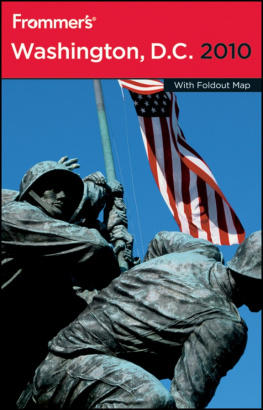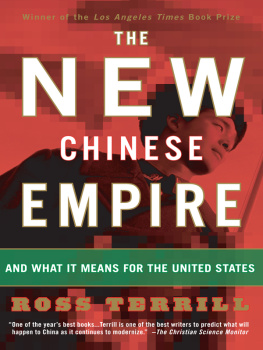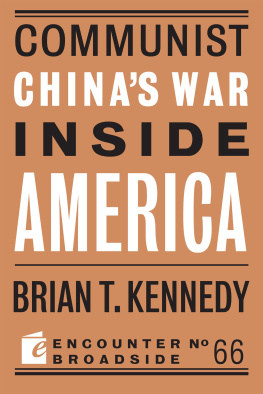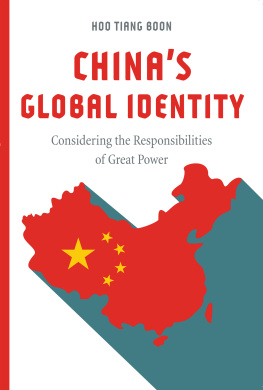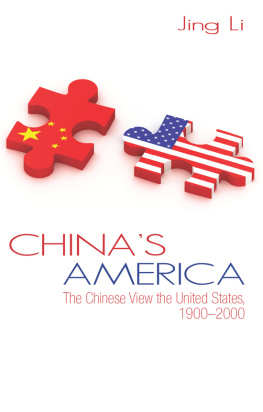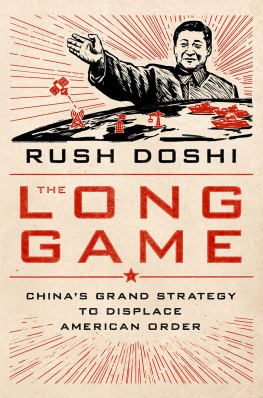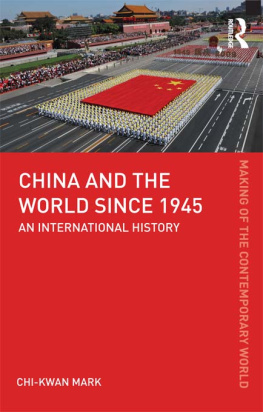China Looks at the West
CHINA
LOOKS AT THE
WEST
Identity, Global Ambitions,
and the
Future of Sino-American Relations
CHRISTOPHER A. FORD

Due to variations in the technical specifications of different electronic
reading devices, some elements of this ebook may not appear
as they do in the print edition. Readers are encouraged
to experiment with user settings for optimum results.
Copyright 2015 by The University Press of Kentucky
Scholarly publisher for the Commonwealth, serving Bellarmine University, Berea College, Centre College of Kentucky, Eastern Kentucky University, The Filson Historical Society, Georgetown College, Kentucky Historical Society, Kentucky State University, Morehead State University, Murray State University, Northern Kentucky University, Transylvania University, University of Kentucky, University of Louisville, and Western Kentucky University.
All rights reserved.
Editorial and Sales Offices: The University Press of Kentucky
663 South Limestone Street, Lexington, Kentucky 40508-4008
www.kentuckypress.com
Library of Congress Cataloging-in-Publication Data
Ford, Christopher A., 1967
China looks at the West : identity, global ambitions, and the future of Sino-American relations / Christopher A. Ford.
pages cm. (Asia in the New Millennium)
Includes bibliographical references and index.
ISBN 978-0-8131-6540-0 (hardcover : acid-free paper) ISBN 978-0-8131-6539-4 (pdf) ISBN 978-0-8131-6541-7 (epub)
1. United StatesForeign relationsChina. 2. ChinaForeign relationsUnited States. 3. ChinaForeign relations21st century. I. Title.
E183.8.C5F67 2015
This book is printed on acid-free paper meeting the requirements of the American National Standard for Permanence in Paper for Printed Library Materials.

Manufactured in the United States of America.

| Member of the Association of
American University Presses |
For Stella-Grace and Schuyler,
at the center of my world.
Contents
VI. China and America in a New World
the Inflection Point of 20082009
Introduction
In ways unprecedented for a state in the modern era, the economic and military power of the Peoples Republic of China (PRC) has developed and expanded rapidly, presenting strategists and policymakers in the United Statesand other countries, particularly those around the PRCs peripherywith a combination of challenges and opportunities the nature and ramifications of which are acutely sensed but still quite incompletely understood. American foreign affairs and national security policymakers, at least, remain divided not only over how to deal with the PRC as a matter of immediate policy concern but also over how to understand Chinas foreign and defense policies and Beijings approach to Sino-American relations even at the most basic of levels.
Some observers look at China and see a rising power that through its very muscularitycoupled with its autocratic political system and its historical opposition to the United Statesalready presents a serious threat, both to U.S. interests and to its neighbors, a threat that may become still more grave in the years ahead. Others see a state that has undergone a remarkable transformation from rigid central planning to a much more marketized economy, a society that is still in transition and that is in no way fated to be Americas adversary. All agree on the need for a relationship with this large and growing power that successfully balances the many political, economic, and security concerns and on the importance of navigating a prudent course between cooperation and confrontation. There is disagreement, however, over what precisely such a relationship requires from Washington and, not least, over what the appropriate admixture should bethat of carrot versus stick, partner versus competitor, or warm versus coldin dealing with Beijing.
This disagreement has roots in uncertainty about the PRCs basic character and direction in the modern world and about how Chinese leaders themselves perceive, and are thus likely to behave toward, the United States. This latter factornamely, Chinas narrative of America and its relationship with PRC politics and policiesis the focus of this book. As Biwu Zhang has noted, Chinese perceptions of the United States necessarily affect Chinas choices with regard to the United States, making it a potentially valuable source of insight to explor[e] a states foreign policy motivation by investigating how it views the foreign Other. In this view: The more China perceives threat and/or opportunity for mutual gains, the more likely it is to be a status quo country; and the more China perceives opportunity for exploitation, the more likely it is to be a revisionist country. The more positive Chinas perception of the United States is, the more likely it is to be a status quo country, and the more negative perception of the United States This book attempts to provide an analytic foundation for approaching such questions in a way informed by history and by an understanding of broad sociocultural and intellectual themes in Chinese political culture that generally receive insufficient (or insufficiently serious) attention in the U.S. policy community. It assumes that by better understanding how it views the United Statesand how it envisions itself in the world in relation to the United Stateswe can learn much about China itself and about the intentions and aspirations that underlie its policy choices.
The following chapters will explore the development of Chinese images of the United Stateshow America has been refracted through the Chinese lens, as it werefrom the Qing dynastys earliest encounters with Americans until the present day, with a special emphasis on the role of such images in Chinese politics and the implications of this entanglement for the Sino-American relationship. As we will see, given the peculiar challenges of studying perceptions in a propaganda-saturated autocracy such as the modern PRC, this study has opted to focus principally on the official America narrative promulgated by the Chinese Communist Party (CCP) and permitted expression within the information space policed by the Party-state. It attempts to analyze this narrative in the context of ongoing developments in Chinese politics, society, and foreign relations, to understand the connections between those elements, and to offer some thoughts about policy lessons that may be of use to U.S. (and other) policymakers.
It is a commonplace observation to note that Chinese have long had a sort of love-hate relationship with the United States. David Shambaugh has argued, for instance, that one dominant theme running throughout Chinas engagement with the West since the nineteenth century has been the ambivalence of its image of America.
Rather than tie itself to these particular dualisms, howeveror, more accurately, to explain why these antinomies seem to fit the situation so wellthis book offers instead a schema of aspiration versus opposition as a framework for analyzing Chinese images of America and their role in Chinese policy and politics. In contrast to love-hate formulations, which generally represent purely affective descriptions, the framework of aspiration versus opposition ties images of the United States more clearly back to Chinese thinking
Next page


